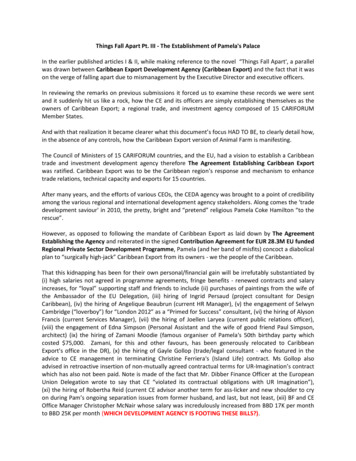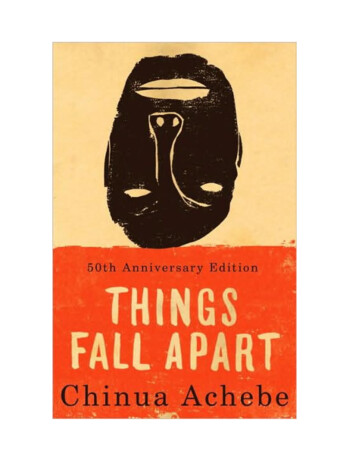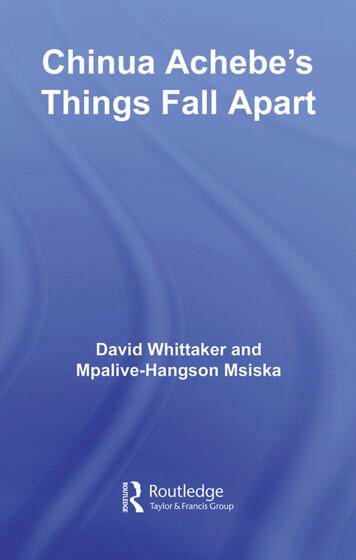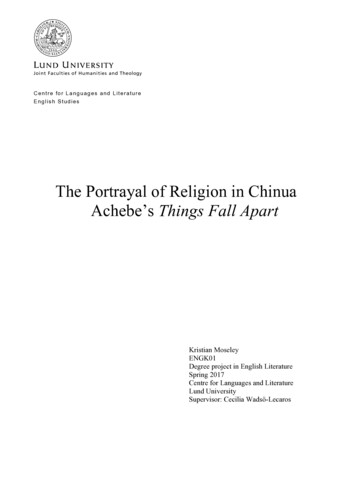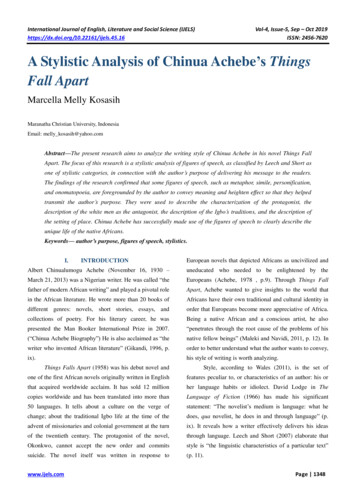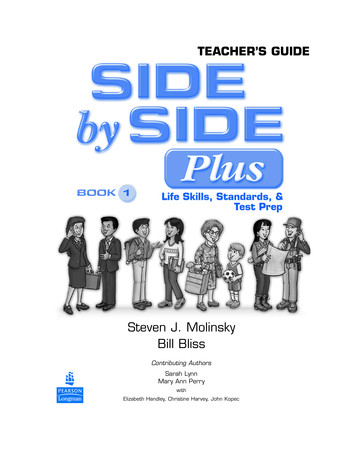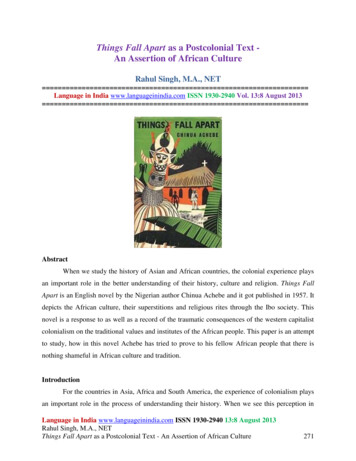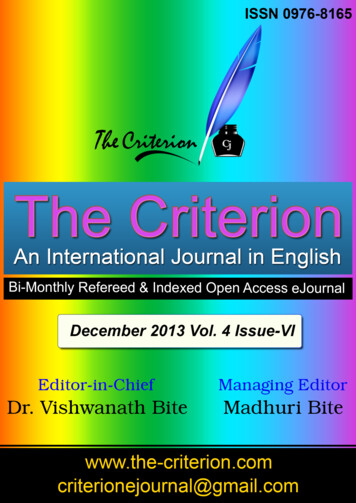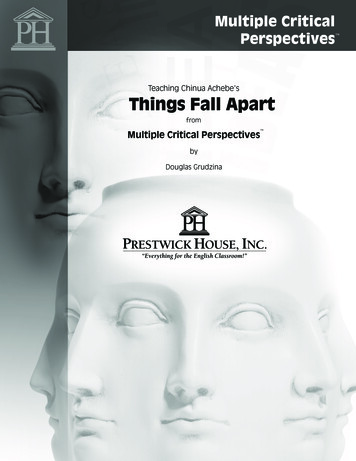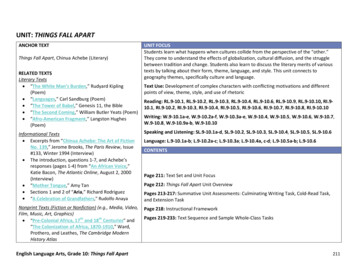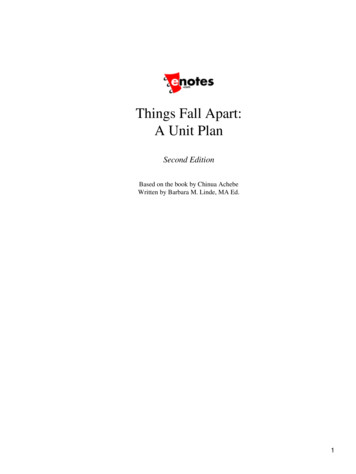
Transcription
Things Fall Apart:A Unit PlanSecond EditionBased on the book by Chinua AchebeWritten by Barbara M. Linde, MA Ed.1
This version distributed by eNotes.com LLC. 1995 by Teacher's Pet Publications, Inc.ALL RIGHTS RESERVED*Only the student materials in this unit plan such as worksheets,study questions, assignment sheets, and tests may be reproducedmultiple times for use in the purchaser’s classroom.For additional copyright questions, please contacteNotes.com LLC or Teacher’s Pet Publications.http:// www.enotes.com2
TABLE OF CONTENTS-Things Fall ApartIntroductionUnit ObjectivesUnit OutlineReading Assignment SheetStudy QuestionsQuiz/Study Questions (Multiple Choice)Pre-Reading Vocabulary WorksheetsLesson One (Introductory Lesson)Nonfiction Assignment SheetOral Reading Evaluation FormWriting Assignment 1Writing Evaluation FormWriting Assignment 2Extra Writing Assignments/Discussion ?sWriting Assignment 3Vocabulary Review ActivitiesUnit Review ActivitiesUnit TestsVocabulary Resource MaterialsUnit Resource Materials57891324415760626465676975767783117129
A FEW NOTES ABOUT THE AUTHORCHINUA ACHEBEACHEBE, Chinua 1930Chinua Achebe was born on November 16, 1930, in Ogidi, Nigeria. He was raised in this traditionalvillage, although his parents were Christians. Achebe considers himself part of a generation that is intransition between the old village ways and the modern world.Mr. Achebe began his career with the Nigerian Broadcasting Corporation, where he worked from 19541966. After that he became a senior research fellow at the University of Nigeria, Nsukka, and then aprofessor of English. From 1972-75 he was a visiting professor of English at the University ofMassachusetts, and was a visiting professor of English at the University of Connecticut in 1975-76.Things Fall Apart was his first novel, published in 1958. This novel established him as a majorcontemporary novelist. Many adult and children’s books followed his first success: No Longer at Ease(1960), The Sacrificial Egg and Other Stories (1962), Arrow of God (1964), A Man of People (1966),Chike and the River (1966), Beware Soul-Brother and Other Poems (1971), The Insider: Stories ofWar and Peace from Nigeria (1971), How the Leopard Got His Claws (1972), Girls at War andOther Stories (1973), Morning Yet on Creation Day (1975), The Flute (1977), and The Drum (1977).Achebe is also the founding editor of the African Writers series published by Heinemann Books.Chike and the River, published in 1966, was his first children’s novel. It is about the adventures of ayoung boy. The Flute is a retelling of a traditional African folktale with some added details. How theLeopard Got His Claws is an animal fable which he wrote during the Biafran War.Chinua Achebe has received many awards, including The Nigerian National Merit Award for intellectualachievement (1970), the Commonwealth Poetry Prize (1974), and the Lotus Award for Afro-AsianWriters (1975). He has honorary degrees from universities in the United States, Scotland, England,Canada, and Nigeria.Mr. Achebe now lives in New York with his wife and four children. He and his wife both teach at BardCollege.
INTRODUCTION-Things Fall ApartThis unit has been designed to develop students’ reading, writing, thinking, listening and speaking skillsthrough exercises and activities related to Things Fall Apart by Chinua Achebe. It includes seventeenlessons, supported by extra resource materials.The introductory lesson introduces students to the novel through the use of a KWL worksheet. Studentsare also given the materials they will use during this unit and are shown how to use these materials.The reading assignments are approximately thirty pages each; some are a little shorter while others area little longer. Students have approximately 15 minutes of pre-reading work to do prior to each readingassignment. This pre-reading work involves reviewing the study questions for the assignment and doingsome vocabulary work for 8 to 10 vocabulary words they will encounter in their reading.The study guide questions are fact-based questions; students can find the answers to these questionsright in the text. These questions come in two formats: short answer or multiple choice. The best use ofthese materials is probably to use the short answer version of the questions as study guides for students(since answers will be more complete), and to use the multiple choice version for occasional quizzes. Itmight be a good idea to make transparencies of your answer keys for the overhead projector.The vocabulary work is intended to enrich students’ vocabularies as well as to aid in the students’understanding of the book. Prior to each reading assignment, students will complete a two-part worksheetfor approximately 8 to 10 vocabulary words in the upcoming reading assignment. Part I focuses onstudents’ use of general knowledge and contextual clues by giving the sentence in which the word appearsin the text. Students are then to write down what they think the words mean based on the words’ usage.Part II gives students dictionary definitions of the words and has them match the words to the correctdefinitions based on the words’ contextual usage. Students should then have an understanding of the wordswhen they meet them in the text.After each reading assignment, students will go back and formulate answers for the study guide questions.Discussion of these questions serves as a review of the most important events and ideas presented in thereading assignments.After students complete extra discussion questions, there is a vocabulary review lesson which pullstogether all of the separate vocabulary lists for the reading assignments and gives students a review of allof the words they have studied.Following the reading of the book, two lessons are devoted to the extra discussion questions/writingassignments. These questions focus on interpretation, critical analysis and personal response, employinga variety of thinking skills and adding to the students’ understanding5
of the novel. These questions are done as a group activity. Using the information they have acquired sofar through individual work and class discussions, students get together to further examine the text and tobrainstorm ideas relating to the themes of the novel.The group activity is followed by a reports and discussion session in which the groups share their ideasabout the book with the entire class; thus, the entire class gets exposed to many different ideas regardingthe themes and events of the book.There are three writing assignments in this unit, each with the purpose of informing, persuading, or havingstudents express personal opinions. The first assignment is to persuade: students will take the role of ayoung clan member who wants to make a change in the way something is done. The second assignmentis to inform: students will write a report from the point of view of the missionary. The third assignment isto express a personal opinion: students will write about a change in their own lives and how it affectedthem.In addition, there is a nonfiction reading assignment. Students are required to read a piece of nonfictionrelated in some way to Things Fall Apart. After reading their nonfiction pieces, students will fill out aworksheet on which they answer questions regarding facts, interpretation, criticism, and personal opinions.During one class period, students make oral presentations about the nonfiction pieces they have read.This not only exposes all students to a wealth of information, it also gives students the opportunity topractice public speaking.The review lesson pulls together all of the aspects of the unit. The teacher is given four or five choicesof activities or games to use which all serve the same basic function of reviewing all of the informationpresented in the unit.The unit test comes in two formats: all multiple choice-matching-true/false or a mixture of matching, shortanswer, and composition. As a convenience, two different tests for each format have been included.There are additional support materials included with this unit. The unit resource section includessuggestions for an in-class library, crossword and word search puzzles related to the novel, and extravocabulary worksheets. There is a list of bulletin board ideas which gives the teacher suggestions forbulletin boards to go along with this unit. In addition, there is a list of extra class activities the teachercould choose from to enhance the unit or as a substitution for an exercise the teacher might feel isinappropriate for his/her class. Answer keys are located directly after the reproducible studentmaterials throughout the unit. The student materials may be reproduced for use in the teacher’s classroomwithout infringement of copyrights. No other portion of this unit may be reproduced without the writtenconsent of Teacher’s Pet Publications, Inc.6
UNIT OBJECTIVES-Things Fall Apart1. Through reading Things Fall Apart, students will analyze characters and their situations to betterunderstand the themes of the novel.2. Students will demonstrate their understanding of the text on four levels: actual, interpretive,critical, and personal.3. Students will practice reading aloud and silently to improve their skills in each area.4. Students will enrich their vocabularies and improve their understanding of the autobiographythrough the vocabulary lessons prepared for use in conjunction with it.5. Students will answer questions to demonstrate their knowledge and understanding of the mainevents and characters in Things Fall Apart.6. Students will practice writing through a variety of writing assignments.7. The writing assignments in this are geared to several purposes:a. To check the students’ reading comprehensionb. To make students think about the ideas presented by the novelc. To make students put those ideas into perspectived. To encourage critical and logical thinkinge. To provide the opportunity to practice good grammar and improve students’use of the English language.8. Students will read aloud, report, and participate in large and small group discussions toimprove their public speaking and personal interaction skills.7
UNIT OUTLINE-Things Fall Apart12IntroductionPVR 5-7Oral ReadingEvaluationRead 1-4Study ?s 1-4PV 1-46Study ?s 8-10PVR 11-137Study ?s 11-13PVR 14-198Study ?s 14-19WritingAssignment 2121311Extra DiscussionQuestionsWritingAssignment 316Unit Review3Library Work4Quiz 1-7PVR 8-105WritingAssignment 19WritingConferences10PVR 20-25Study ?s tP Preview Study Questions V Do Vocabulary Worksheet R Read8
READING ASSIGNMENT SHEET-Things Fall ApartDate AssignedAssignmentPart One, Chapters 1-4Part One, Chapters 5-7Part One, Chapters 8-10Part One, Chapters 11-13Part Two, Chapters 14-19Part Two, Chapters 20-259Completion Date
STUDY GUIDE QUESTIONS
SHORT ANSWER STUDY QUESTIONS-Things Fall ApartChapters 1-41. Why was Okonkwo famous?2. Describe Unoka.3. Why had the men of Umuofia called a meeting?4. Where does the story take place?5. What influence did the oracle have on decisions made in Umuofia?6. What were Okonkwo’s greatest fear and greatest passion?7. What upset Okonkwo most about his son, Nwoye?8. What did Okonkwo bring home from his trip to Mbaino?9. How did Okonkwo begin his prosperous career?10. How did Ikemefuna react to living with Okonkwo’s family?11. What unheard of thing did Okonkwo do during the Week of Peace?12. How did the people view yams?Chapters 5-71. Describe the Feast of the New Yam.2. Who was Okonkwo’s favorite child, and what did he often say about the child?3. What unacceptable thing did Okonkso do just before the Feast of the New Yam?4. Who was Chielo, and why was she important?5. What sport did the villagers enjoy watching during their feasting?6. What influence did Ikemefuna have on Nwoye?7. How did Okonkwo feel about Ikemefuna’s influence on Nwoye?8. How did the villagers feel about the coming of the locusts, and what did they do about it?9. What did the village decide to do with Ikemefuna?10. Who struck the last blow to Ikemefuna, and why?Chapters 8-101. What did Okonkwo do whenever he thought of his father’s weakness and failure?2. What did Okonkwo tell himself about his part in Ikemefuna’s death?3. What did Obierika tell Okonkwo about his part in Ikemefuna’s death?4. Describe the meeting to determine Obierika’s daughter’s bride price.5. The men began discussing rumors about white men. Who did the men think the white men were?6. Describe the relationship between Ekwefi and Ezinma.7. Describe Ekwefi’s difficulties in getting pregnant.8. What did the medicine man tell Okonkwo after the death of Ekwefi’s second child?9. Describe the burial of Ekwefi’s third child, and the reason for it.10. Explain the significance of Ezinma’s iyi-uwa.11. How did Okonkwo cure Ezinma’s iba illness?12. What was the purpose of the ceremony described in Chapter 10?13
Short Answer Study Questions-Things Fall Apart, p. 2Chapters 11-131. What did Chielo want with Ezinma?2. What did Ekwefi do?3. What did Okonkwo do when Chielo took Ezinma?4. What was the purpose of the uri ceremony?5. What was the significance in the amount of wine the family brought?6. What happened at the end of the ceremony?7. Describe Ezeudu’s funeral.8. How did the author describe a man’s life?9. What happened during the frenzy?10. What was the result of Okonkwo’s action?11. What was the reason for the clan’s actions against Okonkwo?12. What did Obierika think about after this calamity, and what was his conclusion?Chapters 14-191. Where did Okonkwo take his family to live?2. How did Okonkwo feel about his circumstances?3. Why did Uchendu talk to Okonkwo about the Mother Supreme?4. Who came to visit Okonkwo during the second year of exile, and why?5. Briefly retell the story of the destruction of Abame.6. What was Obierika’s reaction to the story?7. What event did Obierika describe on his next visit, two years later?8. Who had Obierika found among the missionaries?9. What was the iron horse?10. Where did the missionaries in Mbanta build their church, why were they given that particularpiece of land, and what happened to them?11. What was it about Nwoye’s actions that disturbed Okonkwo so much?12. What group wanted to be admitted to the Christian church, and what happened?13. Describe the incident with the sacred python.14. What did Okonkwo do before he left Mbanta when his exile was ended?15. What was the one elder’s message to those at the feast?14
Short Answer Study Questions-Things Fall Apart, p. 3Chapters 20-251. How did Okonkwo feel about his return to the clan?2. What message did Okonkwo give to his sons and daughters after Nwoye left the family?3. Describe the changes that had come to Umuofia in the seven years that Okonkwo was in exile.4. Okonkwo asked Obierika why the people had lost their power to fight. What was Obierika’sreply?5. How did many of the other villagers feel about these changes?6. What was Mr. Brown’s conclusion about the religion of the clan? How did he act to gainconverts?7. About what was Okonkwo grieving?8. Describe the conflict started by Enoch.9. What was the result of the action taken by the egwuguw?10. How did Okonkwo feel when he returned from the white man’s prison?11. Why did the men meet in the marketplace?12. What event happened in the marketplace?13. What happened to Okonkwo?14. What did Obierika tell the Commissioner?15. What was the Commissioner’s reaction to the incident?15
Short Answer Study Questions-Things Fall Apart, p. 4Chapters 1-41. Why was Okonkwo famous?He was a well known, successful wrestler when he was young. As an adult, he was a wealthyfarmer and strong warrior.2. Describe Unoka.He was Okonkwo’s father. He was lazy and improvident. He constantly borrowed moneythat he didn’t repay.3. Why had the men of Umuofia called a meeting?The men of Mbaino, a neighboring village, had murdered a woman of Umuofia, and the menwanted revenge.4.Where does the story take place?It takes place in the village of Umuofia, in Africa.5. What influence did the oracle have on decisions made in Umuofia?The men didn’t go to war unless the reason was accepted by the oracle.6. What were Okonkwo’s greatest fear and greatest passion?He was afraid that he would resemble his father. His greatest passion was to hate everythinghis father loved.7. What upset Okonkwo most about his son, Nwoye?Nwoye was lazy, not ambitious.8. What did Okonkwo bring home from his trip to Mbaino?He brought home a boy from the village. His name was Ikemefuna.9. How did Okonkwo begin his prosperous career?He took gifts to a wealthy man in the village and asked him for some yam seeds.10. How did Ikemefuna react to living with Okonkwo’s family?At fist he tried to run away, and refused to eat. The family treated him well and he began to\get used to living with them.11. What unheard of thing did Okonkwo do during the Week of Peace?He beat his second wife.16
Short Answer Study Questions-Things Fall Apart, p. 512. How did the people view yams?Yams stood for manliness, and one who could feed his family on yams all year was a great man.Chapters 5-71. Describe the Feast of the New Yam.The Feast of the New Yam was held yearly before the harvest. It honored the earth goddess,Ani, and the ancestral spirits of the clan. New yams were offered to these powers. The oldyams of the previous year were disposed of. All cooking and serving utensils were washed.Yam foo-foo and vegetable soup were the main ceremonial dishes.2. Who was Okonkwo’s favorite child, and what did he often say about the child?His favorite child was Ezinma, daughter of Ekwefi. He often said it was a shame she wasn’ta boy.3. What unacceptable thing did Okonkwo do just before the Feast of the New Yam?He beat his second wife, Ekwefi, then fired his gun at her.4. Who was Chielo, and why was she important?She was the priestess of Agbala, the Oracle of the Hills and the Caves.5. What sport did the villagers enjoy watching during their feasting?They enjoyed watching the young men of the village wrestle.6. What influence did Ikemefuna have on Nwoye?Ikemefuna acted as an elder brother. He made Nwoye feel grown up. Nwoye began actingmore like a man.7. How did Okonkwo feel about Ikemefuna’s influence on Nwoye?He was inwardly pleased, although he would not show it. He did, however, invite the boysto sit with him and told them stories of the land.8. How did the villagers feel about the coming of the locusts, and what did they do about it?They were delighted to have the locusts. They caught as many a possible, roasted them, andate them as a delicacy.9. What did the village decide to do with Ikemefuna?The oracle decided that the villagers should kill him.17
Short Answer Study Questions-Things Fall Apart, p. 610. Who struck the last blow to Ikemefuna, and why?Okonkwo did, because he was afraid of being thought weak.Chapters 8-101. What did Okonkwo do whenever he thought of his father’s weakness and failure?He thought of his own strength and success.2. What did Okonkwo tell himself about his part in Ikemefuna’s death?He said he was becoming a woman. A man who had killed five men in battle should not fallto pieces over the death of a boy.3. What did Obierika tell Okonkwo about his part in Ikemefuna’s death?Obierika said it was the kind of action that would not please the Earth; that the goddesswould wipe out an entire family for such an action.4. Describe the meeting to determine Obierika’s daughter’s bride price.The suitor, Ibe, his father, Ukegbu, and uncle met with Obierika, his brothers, his son, andOkonkwo. They ate kola nuts and drank palm wine. Then Obierika gave Ukegbu a bundleof thirty short broomsticks. Ukegbu and his clan took the sticks outside. When they returnedthey gave a bundle of fifteen sticks to Obierika. He added ten more sticks and gave the bundleback. The two groups finally agreed at a bride-price of twenty bags of cowries.5. The men began discussing rumors about white men. Who did they think the white men were?The polite word for leprosy was “the white skin.” The men in the hut thought the white menwere lepers.6. Describe the relationship between Ekwefi and Ezinma.It was more like the companionship of equals, rather than that of mother and daughter.7. Describe Ekwefi’s difficulties in getting pregnant.She had borne ten children, but nine of them had died in infancy. She began giving themnames like “Death, I implore you” and “May it not happen again.”8. What did the medicine man tell Okonkwo after the death of Ekwefi’s second child?He said there was an ogbanje, a wicked child who, when it died, re-entered its mother’swomb to be born again. He said Ekwefi should go and stay with her people when she becamepregnant again.18
Short Answer Study Questions-Things Fall Apart, p. 79. Describe the burial of Ekwefi’s third child, and the reason for it.The medicine man ordered that there be no mourning or funeral. He mutilated the dead childand buried it in the Evil forest. He said this would make the ogbanje think about comingagain.10. Explain the significance of Ezinma’s iyi-uwa.This was a special kind of stone that formed the link between an ogbanje and the spirit world.If it were discovered, then the child would not die. When Okagbue found Ezinma’s iyi-uwa,the people knew Ezinma’s troubles were over.Chapters 8-10 continued11. How did Okonkwo cure Ezinma’s iba illness?He brewed a potion made of leaves and herbs, then put her over the steam.12. What was the purpose of the ceremony described in Chapter 10?A woman’s birth family was having a dispute with her husband because he was mistreatingher. The only decision the man would accept in the case was that of the symbolic meetingof the clan spirits.Chapters 11-131. What did Chielo want with Ezinma?Chielo wanted to take Ezinma to see Agbala.2. What did Ekwefi do?She followed Chielo and Ezinma to the cave of Agbala.3. What did Okonkwo do when Chielo took Ezinma?He followed her, too, with his machete.4. What was the purpose of the uri ceremony?The family of the suitor was bringing palm-wine to Obierika and his extensive group ofkinsmen.5. What was the significance in the amount of wine the family brought?They were thought to be behaving like men if they brought a generous amount.6. What happened at the end of the ceremony?The bride-to-be went to live with her suitor’s family for seven market weeks.19
Short Answer Study Questions-Things Fall Apart, p. 87. Describe Ezeudu’s funeral.He was the clan elder, so there was a great ceremony. There was a lot of shouting, drumbeating, and firing of guns.8. How did the author describe a man’s life?A man’s life was a series of transition rites which brought him closer to death and hisancestors.9. What happened during the frenzy?Okonkwo accidentally shot a boy.10. What was the result of Okonkwo’s action?He and his family were forced to leave the clan for seven years. The men from Ezeudu’squarter demolished Okonkwo’s houses and barn, and killed his animals.11. What was the reason for the clan’s actions against Okonkwo?They were cleansing the land which Okonkwo had polluted. It was not revenge.12. What did Obierika think about after this calamity, and what was his conclusion?He wondered why a man should suffer because of an inadvertent mistake. He also wonderedwhy he had to throw away his wife’s twins when they were born. He concluded that the clanhad to punish offenses so that the Earth would not loose her wrath on all the land, instead ofjust on the offender.Chapters 14-191. Where did Okonkwo take his family to live?He took them to live with his mother’s kinsmen in Mbanta.2. How did Okonkwo feel about his circumstances?He thought his personal god or chi was not meant for great things. He was feeling despair.3. Why did Uchendu talk to Okonkwo about the Mother Supreme?He wanted Okonkwo to realize that his despair was, comparatively, not that great, and that heowed it to his family to comfort and support them. He told Okonkwo not to refuse comfort inhis mother’s homeland, or he would displease the dead.4. Who came to visit Okonkwo during the second year of exile, and why?Obierika came to bring Okonkwo news of the village and money from the yam crop he wastending until Okonkwo returned home.20
Short Answer Study Questions-Things Fall Apart, p. 95. Briefly retell the story of the destruction of Abame.A white man riding an iron horse had come to the village. The elders killed the man and tied hisiron horse to their sacred tree. A few months later, three white men came, saw the iron horse,and left again. A few weeks later, on market day, the white men surrounded the market andkilled all of the people there.6. What was Obierika’s reaction to the story?He said he was afraid, because he had heard other stories about white men with powerful gunswho took men away as slaves.7. What event did Obierika describe on his next visit, two years later?The missionaries had come to Umuofia. They had built a church, won converts, and weresending evangelists to surrounding villages.8. Who had Obierika found among the missionaries?He had found Okonkwo’s son, Nwoye.9. What was the iron horse?It was a bicycle.10. Where did the missionaries in Mbanta build their church, why were they given that particularpiece of land, and what happened to them?The villagers gave the missionaries land in the Evil Forest, because they didn’t really wantthem, and they thought the missionaries would decline the offer. When the missionaries werealive and well when the villagers expected them to be dead, they won more converts.11. What was it about Nwoye’s actions that disturbed Okonkwo so much?He was concerned that Nwoye and his other male children would abandon their ancestors.He pictured himself and his fathers waiting in vain for worship and sacrifice.12. What group wanted to be admitted to the Christian church, and what happened?The osu, or outcasts, wanted to be admitted. Mr. Kiaga agreed, on the condition that theyshave their long, tangled hair. They did so, and survived, and became strong proponents ofthe faith.21
Short Answer Study Questions-Things Fall Apart, p. 1013. Describe the incident with the sacred python.The sacred python was the most revered animal in the area. It was thought to be theemanation of the god of water. No one had ever even thought of killing it. One of the formeroutcasts, now a Christian, had alledgedly killed the sacred python, although it was neverproved. The elders decided to ostracize the Christians. Soon after this decision, the allegedkiller died, and the clan agreed not to bother the other Christians.14. What did Okonkwo do before he left Mbanta when his exile was ended?He held a great feast to thank his mother’s kinsmen for their hospitality.15. What was the one elder’s message to those at the feast?He told them he feared for their generation because they didn’t understand how strong thebonds of kinship should be. He was concerned because they had let this strange religion startto break apart their clans.Chapters 20-251. How did Okonkwo feel about his return to the clan?He knew that he had lost a lot of ground, but he was determined to return with a flourish, andregain the lost time.2. What message did Okonkwo give to his sons and daughters after Nwoye left the family?He told his sons if they were going to be weak and follow Nwoye, they should do it while hewas alive. If they turned against him after he died, he would return and break their necks. Heasked his daughters to wait until they returned to Umuofia to marry.3. Describe the changes that had come to Umuofia in the seven years that Okonkwo was in exile.The Christian church had many converts. The white men had brought a government and built acourt. The new prison was full of men who had broken the white men’s laws.4. Okonkwo asked Obierika why the people had lost their power to fight. What was Obierika’sreply?He said that too many of their people had joined with the white men in their religion and inupholding their laws. The white men managed to divide the clans and they were falling apart.5. How did many of the other villagers feel about these changes?They liked the trading store and the resultant money that was coming into Umuofia. Theywere also starting to think that the religion had some substance.22
Short Answer Study Questions-Things Fall Apart, p. 116. What was Mr. Brown’s conclusion about the religion of the clan? How did he act to gainconverts?He decided a frontal attack would not work. Instead, he built a school and a hospital. Whenthe people began seeing results from their schooling, and had illnesses healed, they beganconverting.7. About what was Okonkwo grieving?He mourned for the clan because it was falling apart. He also mourned for the men, becausehe thought they were getting soft, like women.8. Describe the conflict started by Enoch.Enoch publicly unmasked one of the egwugwu, thus killing an ancestral spirit. The rest of themasked egwugwu destroyed Enoch’s compound, then headed for the church. They destroyedthe church, but let Mr. Smith and the others live.9. What was the result of the action taken by the egwuguw?Okonkwo and five of the leaders were imprisoned by the District Commissioner.The village of Umuofia was fined 200 bags of cowries.10. How did Okonkwo feel when he returned from the white man’s prison?He was full of hate and bitterness, and wanted revenge.11. Why did the men meet in the marketplace?They met to discuss what their course of action should be.12. What event happened in the marketplace?Five court messengers came to stop the meeting. Okonkwo decapitated one of them.13. What happened to Okonwo?He hanged himself.14. What did Obierika tell the Commissioner?Obierika said the Commissioner had driven Okonkwo to kill himself.15. What was the commissioner’s reaction to the incident?He thought about how he could use the incident as material in
7 UNIT OBJECTIVES-Things Fall Apart1. Through reading Things Fall Apart, students will analyze characters and their situations to better understand the themes of the novel. 2. Students will demonstrate their understanding of the text on four levels: actual, interpretive,
